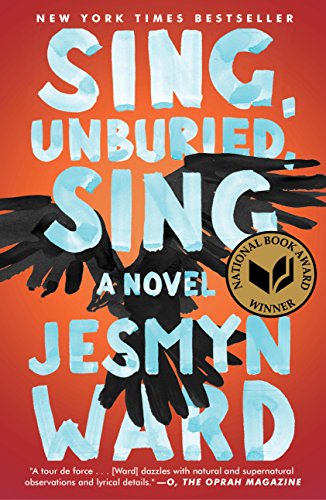 This book
recently won the National Book Award for Fiction so I decided to read it. I certainly understand why it received the
prize.
This book
recently won the National Book Award for Fiction so I decided to read it. I certainly understand why it received the
prize.
The novel
is set in a coastal town in Mississippi.
Thirteen-year-old Jojo and his three-year-old sister Kayla live with
their maternal grandparents, Mam and Pop, because their mother Leonie, a drug
addict, often disappears for days. Their
father Michael, a white man, is released after serving three years in Parchman,
the state penitentiary, and Leonie, wanting to reunite her family, insists on taking
her children when she drives north to pick him up.
The book
examines the effects of racism and injustice on a rural black family. An 18-year-old black man is killed because he
dares to win a shooting contest with a white man; the court rules the incident an
accident. When faced with a 13-year-old black
boy and a white woman who is probably still high on drugs, a policeman choses
to handcuff the boy and even aims a gun at him.
Being black means having limited options; Mam speaks of “Growing old
with my mouth twisted bitter at the taste of what I’d been accorded in the
feast of life: mustard greens and raw
persimmons, sharp with unfulfilled promise and loss.” Leonie echoes these feelings when she
mentions, “Sometimes the world don’t give you what you need, no matter how hard
you look. Sometimes it withholds.” The ghost of a young man imprisoned at
Parchman emphasizes how little has changed over time: “Parchman was past, present, and future all
at once. . . . [At the old Parchman] I watched chained men clear the land and
lay the first logs for the first barracks for gunmen and trusty shooters. . . .
[At the new Parchman I saw] men who wore their hair long and braided to their
scalps, who sat for hours in small, windowless rooms, staring at big black
boxes that streamed dreams. Their faces
in the blue light were stiff as corpses.”
What stands
out for me is the realistic character portrayal. The first impression the reader has of Leonie
is that she is self-absorbed and a negligent parent. Leonie even admits that “’I’m too selfish.’” Mam tells Jojo that Leonie, “’ain’t got the
mothering instinct. . . . she love you.
She don’t know how to show it.
And her love for herself and her love for Michael – well, it gets in the
way. It confuses her.’” Then gradually, the reader is given Leonie’s
perspective and he/she sees a woman who is grieving for her murdered
brother. Her disappointment with life
and her shame because of her behaviour become palpable. At one point, Leonie has a dream of being marooned
on a raft, a dream which clearly describes her situation in the world and her
feelings: “I’m not alone in the raft
because Jojo and Michaela and Michael are with me and we are elbow to
elbow. But the raft must have a hole in
it, because it deflates. We are all sinking,
and there are manta rays gliding beneath us and sharks jostling us. I am trying to keep everyone above water,
even as I struggle to stay afloat. I
thrust them up toward the surface, to the fractured sky so they can live, but
they keep slipping from my hands. . . . I am failing them. We are all drowning.” One cannot but have some sympathy for
her.
Jojo is
another character who makes a strong impression. He is a very sensitive young man. He adores his grandfather whom he tries to
emulate, but he distrusts his mother because of her drug use so he takes
responsibility for looking after his sister and is fiercely protective of her. Not understanding his mother’s suffering, at
times he is very judgmental, but he is a son most parents could not but be proud
of.
Not being a
fan of magic realism, the one element I did not enjoy is the ghost
stories. The ghosts of two young black men
who did not get a chance to grow up occupy a huge presence in the second half
of the book. There are other ghosts as
well who died violent deaths and have not found peace: “He
raped me and suffocated me until I died I put my hands up and he shot me eight
times she locked me in the shed and starved me to death while I listened to my
babies playing with her in the yard they came in my cell in the middle of the
night and they hung me they found I could read and they dragged me out to the
barn and gouged my eyes before they beat me still I was sick and he said I was
an abomination and Jesus say suffer little children so let her go and he put me
under the water and I couldn’t breathe.”
I understand their thematic purpose in the book, but I did not find
their presence as effective as those in Lincoln
in the Bardo.
Despite
this reservation, I do recommend the book though readers should be forewarned
that it is a disheartening read.
No comments:
Post a Comment